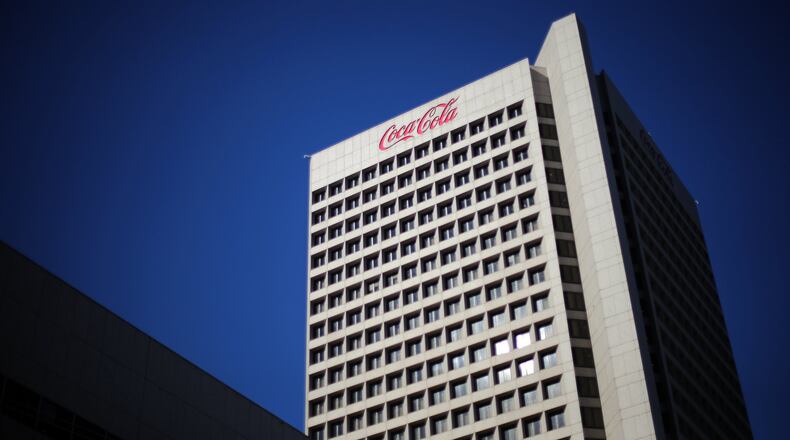Coca-Cola said it will require diversity among law firms who bill it for work in the United States — and reduce payments if they don’t comply.
The Atlanta-based beverage giant’s general counsel, a recent hire from the top ranks of Ford, disclosed the changes in a letter Thursday to law firms the company uses.
“Quite simply, we are no longer interested in discussing motivations, programs, or excuses for little to no progress – it’s the results that we are demanding and will measure going forward,” Bradley Gayton wrote.
And he told The Atlanta Journal-Constitution that he hopes other major companies make similar moves to “change the trajectory” of diversity in the field.
The specific targets and penalties come after many Fortune 500 companies pledged to address racial inequality more aggressively in the wake of last year’s widespread Black Lives Matter protests.
Coke said it will require quarterly reporting about the makeup of legal teams that do work for it and self identify as American Indian, Alaska Native, Asian, Black, women, Hispanic/Latinx, LGBTQ+, Native Hawaiian, Pacific Islander or persons with disabilities. For those working on new matters for Coke, “at least 30% of each of billed associate and partner time will be from diverse attorneys, and of such amounts at least half will be from Black attorneys.”
It said the percentages, which are roughly equal to those of the U.S. population overall, will be adjusted over time to eventually hit at least 50% of billed time coming from diverse attorneys, with half from Black attorneys.
Firms that fail to meet the targets will be docked 30% of their fees, and those who continue to come up short may no longer be considered for Coke work.
Other major U.S. companies have pushed for greater diversity among their law firms, with some saying they will cut fees for those who don’t comply.
“I haven’t seen something as clear and direct as what Coca-Cola has done today,” said Meera Deo, a Thomas Jefferson School of Law professor who focuses on diversity issues.
It’s common for big law firms to stress on their websites how much they value inclusion and diversity. Yet U.S. law firms tend to be far less diverse than the nation as a whole, according to a 2019 report by the National Association for Law Placement.
About one-fourth of law firm associates are people of color, according to the report. Less than 5% of all associates were Black, compared with more than 13% of the overall U.S. population. Among law firm partners, just under 2% were Black and less than 10% of all partners were people of color.
The issue extends well beyond the legal profession. For years, big companies have asserted the importance of having diversity in their own ranks and those of their vendors. Success has been spotty.
Coke has fielded criticism internally and externally from some who felt the company lost steam on earlier gains it had made with its own management. James Quincey, the company’s chief executive, last year committed to doubling Coke’s purchases from Black-owned businesses in the United States over five years.
Quincey said in a recent panel discussion that, in terms of diversity, Coke had done well at its board level and “reasonably well” in the executive ranks, but “we need to do much better” in the professional and middle-tier ranks. He also said large companies can influence small companies around them “and help them to live up to the dream.”
Coke has about 240 legal staffers globally, half in the U.S. About half of its U.S. attorneys are white. About 23% are black, 18% are Asian and 10% are Hispanic.
Gayton, the company’s legal chief, said the numbers are “pretty good” but “to be honest with you I want to do better with Hispanic and Latinx.”
In his letter to law firms, Gayton, who is a Black person, wrote that years of score cards, summits, committees and action plans “are not working.”
He told the AJC that firms need to expand the law schools where they recruit, have top leadership be more engaged in the issue and be more clear about how they assign work and give credit for it.
Coke works with several dozen law firms globally. Gayton said he doesn’t know what percent already comply with the new targets. The company declined to share what it spends with the firms annually.
King & Spalding, a firm with a big Atlanta presence and decades of experience representing Coke, did not answer AJC questions about the racial makeup of its partner ranks or its attorneys who work with the beverage company.
“We are strongly committed to diversity as a firm,” Harold Franklin, a partner and chairman of the firm’s diversity committee, said in an emailed statement. “We look forward to the opportunity to continue to work with Coca-Cola on efforts to increase diversity and inclusion across our profession.”
In 2017, HP told U.S.-based law firms it works with to maintain “minimally diverse staffing” on HP matters or it would withhold 10% of fees. Compliance at law firms jumped from just under 50% at the start of the program to 95% now, according to the company.
About the Author
Keep Reading
The Latest
Featured




